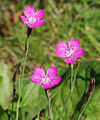Flower of the Year Campaign in Germany
In 1979, Loki Schmidt (1919–2010), the spouse of former German Federal chancellor Helmut Schmidt, founded the Stiftung zum Schutze gefährdeter Pflanzen ("Foundation for the protection of endangered plants") which became the Stiftung Naturschutz Hamburg und Stiftung zum Schutze gefährdeter Pflanzen ("Foundation Nature Conservancy Hamburg and for the protection of endangered plants") in 1985. One of the main purposes of this organisation is a public awareness campaign about the ecological value of wildflowers. This campaign which celebrate a wildflower of the year was established in 1980. The announcement for the flower of the year is often published in October and events to protect the critically endangered, endangered or vulnerable wildflowers are organised. In 2003, Schmidt published a book about this campaign with watercolour illustrations of the plants by herself and a foreword titled "With Loki's eyes" written by Siegfried Lenz.
List of wildflowers announced as Flower of the Year in Germany[edit]
| Year | Scientific name | English name | German name | Image |
|---|---|---|---|---|
| 1980 | Gentiana pneumonanthe | Marsh gentian | Lungen-Enzian | 
|
| 1981 | Narcissus pseudonarcissus | Wild daffodil | Gelbe Narzisse | 
|
| 1982 | Cephalanthera rubra | Red helleborine | Rotes Waldvögelein | 
|
| 1983 | Tulipa sylvestris | Wild tulip | Wildtulpe | 
|
| 1984 | Adonis aestivalis | Summer pheasant's-eye | Sommer-Adonisröschen | 
|
| 1985 | Aquilegia vulgaris | Common columbine | Wald-Akelei | 
|
| 1986 | Arnica montana | Mountain arnica | Arnika | 
|
| 1987 | Eryngium maritimum | Sea holly | Stranddistel | 
|
| 1988 | Calla palustris | Bog arum | Sumpf-Calla, Drachenwurz | 
|
| 1989 | Dianthus carthusianorum | Carthusian pink | Karthäuser-Nelke | 
|
| 1990 | Jasione montana | Sheep's bit scabious | Sandknöpfchen | 
|
| 1991 | Andromeda polifolia | Bog-rosemary | Rosmarinheide | 
|
| 1992 | Drosera rotundifolia | Common sundew | Rundblättriger Sonnentau | 
|
| 1993 | Fritillaria meleagris | Snake's-head fritillary | Schachbrettblume | 
|
| 1994 | Dactylorhiza majalis | Western marsh orchid | Breitblättriges Knabenkraut | 
|
| 1995 | Trollius europaeus | Globe-flower | Trollblume | 
|
| 1996 | Pulsatilla vulgaris | Pasque-flower | Echte Küchenschelle, Kuhschelle | 
|
| 1997 | Carlina acaulis | Stemless carline thistle | Silberdistel | 
|
| 1998 | Stratiotes aloides | Water soldier | Krebsschere, Wasseraloe | 
|
| 1999 | Caltha palustris | Marsh marigold | Sumpfdotterblume | 
|
| 2000 | Lithospermum purpurocaeruleum | Purple gromwell | Purpurblauer Steinsame | 
|
| 2001 | Geranium sanguineum | Bloody cranesbill | Blutroter Storchschnabel | 
|
| 2002 | Viola riviniana | Common dog-violet | Hain-Veilchen | 
|
| 2003 | Agrostemma githago | Common corncockle | Kornrade | 
|
| 2004 | Soldanella alpina | Alpine snowbell | Alpenglöckchen | 
|
| 2005 | Rhinanthus angustifolius | Greater yellow-rattle | Großer Klappertopf | 
|
| 2006 | Cardamine pratensis | Cuckoo flower | Wiesen-Schaumkraut | 
|
| 2007 | Geum rivale | Water avens | Bach-Nelkenwurz | 
|
| 2008 | Carduus nutans | Nodding thistle | Nickende Distel | 
|
| 2009 | Cichorium intybus | Common chicory | Wegwarte | 
|
| 2010 | Iris sibirica | Siberian iris | Sibirische Schwertlilie | 
|
| 2011 | Narthecium ossifragum | Bog asphodel | Moorlilie | 
|
| 2012 | Dianthus deltoides | Maiden pink | Heidenelke | 
|
| 2013 | Anemone hepatica | Common hepatica | Leberblümchen | 
|
| 2014 | Butomus umbellatus | Flowering rush | Schwanenblume | 
|
| 2015 | Succisa pratensis | Devil's-bit | Gewöhnlicher Teufelsabbiss | 
|
| 2016 | Primula veris | Cowslip | Echte Schlüsselblume | 
|
| 2017 | Papaver rhoeas | Common poppy | Klatschmohn | 
|
| 2018 | Veronica longifolia | Garden speedwell | Langblättriger Ehrenpreis | 
|
| 2019 | Calluna vulgaris | Common Heather | Besenheide | 
|
| 2020 | Menyanthes trifoliata | Bogbean | Fieberklee | 
|
| 2021 | Sanguisorba officinalis | Great burnet | Großer Wiesenknopf | 
|
References[edit]
- Loki Schmidt (2003). Die Blumen des Jahres [The Flowers of the Year] (in German). Hamburg: Hoffmann und Campe. ISBN 978-3-455-09395-7.
- "Blume des Jahres" [Flower of the Year] (in German). Stiftung Naturschutz Hamburg und Stiftung Loki Schmidt. Archived from the original on October 28, 2011. Retrieved October 21, 2011.
